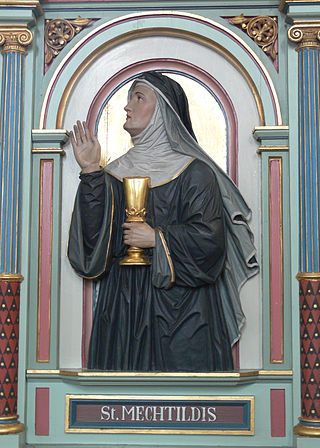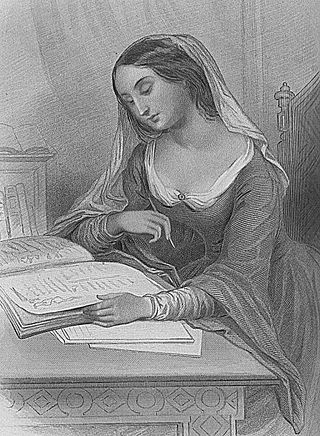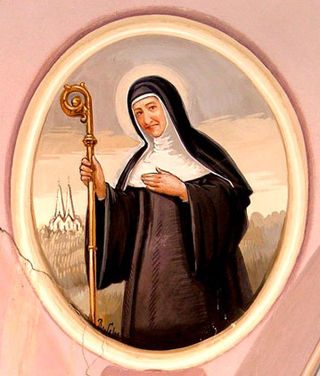Related Research Articles

Hildegard of Bingen OSB,, also known as the Sibyl of the Rhine, was a German Benedictine abbess and polymath active as a writer, composer, philosopher, mystic, visionary, and as a medical writer and practitioner during the High Middle Ages. She is one of the best-known composers of sacred monophony, as well as the most recorded in modern history. She has been considered by a number of scholars to be the founder of scientific natural history in Germany.

Medieval literature is a broad subject, encompassing essentially all written works available in Europe and beyond during the Middle Ages. The literature of this time was composed of religious writings as well as secular works. Just as in modern literature, it is a complex and rich field of study, from the utterly sacred to the exuberantly profane, touching all points in between. Works of literature are often grouped by place of origin, language, and genre.

Mechthildof Magdeburg, a Beguine, was a Christian medieval mystic, whose book Das fließende Licht der Gottheit is a compendium of visions, prayers, dialogues and mystical accounts. She was the first mystic to write in Low German.

Héloïse, variously Héloïse d'Argenteuil or Héloïse du Paraclet, was a French nun, philosopher, writer, scholar, and abbess.
Benjamin Bagby is an American singer, composer, harpist, and performer of medieval music.
The Letters of Abelard and Heloise are a series of passionate and intellectual correspondences written in Latin during the 12th century. The authors, Peter Abelard, a prominent theologian, and his pupil, Heloise, a gifted young woman later renowned as an abbess, exchanged these letters following their ill-fated love affair and subsequent monastic lives.
Viriditas is a word meaning vitality, fecundity, lushness, verdure, or growth. It is particularly associated with abbess Hildegard von Bingen, who used it to refer to or symbolize spiritual and physical health, often as a reflection of the Divine Word or as an aspect of the divine nature.

Gertrude the Great, OSB was a German Benedictine nun and mystic from the monastery of Helfta. She is recognized as a saint by the Catholic Church and figures in the General Roman Calendar on November 16 for optional celebration as a memorial throughout the Roman Rite.

Mechtilde of Hackeborn, OSB, also known as Mechtilde of Helfta, was a Saxon Christian saint and a Benedictine nun. She was famous for her musical talents, gifted with a beautiful voice. At the age of 50, Mechtilde went through a grave spiritual crisis, as well as physical suffering. In the modern Benedictine calendar, her feast is celebrated on the anniversary of her death, November 19. She died in the convent of Helfta, near Eisleben.

Christina the Astonishing, also known as Christina Mirabilis, was a Christian holy woman born in Brustem, Belgium. Christina is primarily known for her legendary resurrection during her funeral mass, and numerous other miracles attributed to her during her life. Thomas of Cantimpré wrote a hagiography of her based on accounts from people who knew her, which made her known outside of Sint-Truiden.
Marguerite Porete was a Beguine, a French-speaking mystic and the author of The Mirror of Simple Souls, a work of Christian mysticism dealing with the workings of agape. She was burnt at the stake for heresy in Paris in 1310 after a lengthy trial for refusing to remove her book from circulation or to recant her views.
Ordo Virtutum is an allegorical morality play, or sacred music drama, by Hildegard of Bingen, composed around 1151, during the construction and relocation of her Abbey at Rupertsberg. It is the earliest morality play by more than a century, and the only medieval musical drama to survive with an attribution for both text and music.

Thomas of Cantimpré was a Flemish Catholic medieval writer, preacher, theologian and a friar belonging to the Dominican Order. He is best known for his encyclopedic work on nature De natura rerum, for the moral text Bonum universale de Apibus and for his hagiographical writings.

Saint Bertha of Bingen was the mother of Rupert of Bingen. Her biography was written, and subsequently her cult popularized, by Hildegard of Bingen, who lived in the same region, about four hundred years later. Bertha and Rupert share a feast day on 15 May.

Scivias is an illustrated work by Hildegard von Bingen, completed in 1151 or 1152, describing 26 religious visions she experienced. It is the first of three works that she wrote describing her visions, the others being Liber vitae meritorum and De operatione Dei. The title comes from the Latin phrase Sci vias Domini. The book is illustrated by 35 miniature illustrations, more than that are included in her two later books of visions.
This is a bibliography of Hildegard of Bingen's works.

This is a discography of Hildegard of Bingen's musical works.
Constant Mews, D.Phil (Oxon) is Professor of Medieval Thought and Director, Centre for Studies in Religion and Theology, Monash University, Melbourne. He is an authority on medieval religious thought, especially on the medieval philosopher and theologian, Peter Abelard, and on interfaith dialogue. He discovered and published what are possibly the original letters exchanged between Peter Abelard and his lover, Heloise.

Peter Abelard was a medieval French scholastic philosopher, leading logician, theologian, poet, composer and musician.
For medieval women, mysticism was "a succession of insights and revelations about God that gradually transformed the recipient" according to historian Elizabeth Petroff of Oxford University in her 1994 book, Body and Soul. The word "mysticism" has its origin in ancient Greece where individuals called the mystae participated in mystery religions. This page focuses on examples primarily relating to Christian expressions of mysticism amongst women, their lives, and their significant contributions to their communities' theology and cultural psyche. The life of a medieval woman mystic was spent seeking unity with God in a series of stages. The mystical life of a medieval woman began with a purge of the spirit in which she released herself from earthly indulgences and attachments. In a state of contrition the medieval woman mystic faced suffering because of her past sins, and the mercy of God was revealed to her through penitence. Mystics sought to imitate the suffering of Christ in order to gain an understanding through experience. During the compassion stage of suffering, the pain experienced by the medieval woman mystic "revealed the believer's love of Christ, fostered unity with Christ and the world, and began to draw the believer beyond the physical Jesus who suffered on the Cross to understand the immensity of the love that motivated Christ in the world to suffer on humanity's behalf". Medieval women mystics experienced visions during what medieval historians refer to as the Illuminative stage of their lives that contained instructions from God and would communicate their revelations in written form.
References
- ↑ Tassoni, Sarah (January 17, 2013). "Northwestern faculty hold panel, Q&A about the history of sexuality". The Daily Northwestern . Retrieved February 5, 2015.
- ↑ "Newly Elected – April 2017". American Philosophical Society. September 15, 2017. Archived from the original on September 15, 2017. Retrieved August 23, 2018.
- ↑ Stephan, Terry (Summer 2002). "God and the Goddess". Northwestern Magazine. Northwestern University. Retrieved February 4, 2015.
- 1 2 3 "God and the Goddesses (book review)". University of Pennsylvania Press. 2015. Retrieved February 19, 2015.
- ↑ Harmless, William (2008). Mystics. Oxford University Press. p. 77. ISBN 9780195300390.
- ↑ "Frauenlob's Song of Songs (book review)". Penn State University Press. Retrieved February 19, 2015.
- ↑ "MAA News – 2015 Election Results". The Medieval Academy Blog. 2015. Retrieved February 4, 2015.
- ↑ "Fellows of the Medieval Academy". The Medieval Academy of America. Retrieved August 12, 2024.
- ↑ "List of Active Members by Class" (PDF). Bulletin of the American Academy of Arts & Sciences. Fall 2014. Retrieved February 4, 2015.
- ↑ "Mellon Foundation Names 2008 Distinguished Achievement Award Recipients". Philanthropy News Digest. March 27, 2009. Retrieved February 4, 2015.
- ↑ "The Haskins Medal: List of Recipients, 1940–2013". The Medieval Academy of America. 2015. Retrieved February 19, 2015.
- ↑ "CHOICE Names 2014 Outstanding Academic Books". University of Notre Dame Press. January 14, 2015. Retrieved March 5, 2015.
- ↑ "Brepols - Mystics, Goddesses, Lovers, and Teachers". www.brepols.net. Retrieved July 8, 2024.